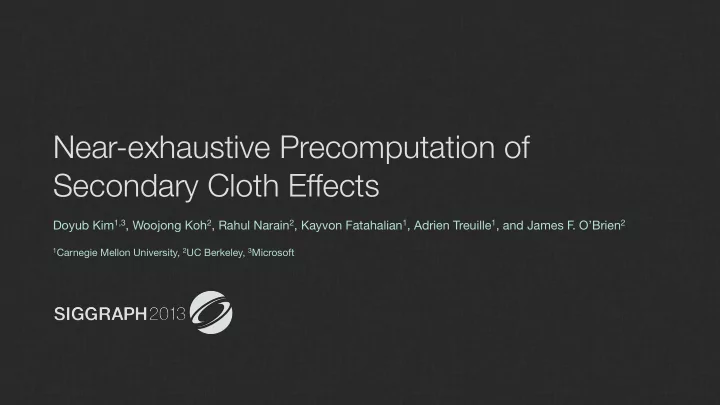

Near-exhaustive Precomputation of Secondary Cloth Effects Doyub Kim 1,3 , Woojong Koh 2 , Rahul Narain 2 , Kayvon Fatahalian 1 , Adrien Treuille 1 , and James F . O’Brien 2 1 Carnegie Mellon University, 2 UC Berkeley, 3 Microsoft
Real-time Cloth Animation Made Possible by Near-exhaustive Precomputation 29,654 vertices cloth mesh 4,550 CPU-hours of precomputation 66 MB run-time footprint
Data-driven Simulation Run low-res simulation and add detail • Wang et al. 2010, Kavan et al. 2010, Feng et al. 2010 Model reduction • Treuille et al. 2006, Wicke et al. 2009 Tabulate the dynamics • James and Fatahalian 2003 Wang et al. 2010 Treuille et al. 2006 Curse of dimensionality • System under very controlled settings • Low resolution / limited quality James and Fatahalian 2003
Leverage modern scale computing system to solve really hard problems • Computer vision, speech recognition, machine translation, etc May not be possible to have everything , but possible to have almost important data • Halevy and Norvig, “The Unreasonable E ff ectness of Data”, 2009
Goals High-quality cloth animation on a human character • As good as any o ff -line simulator High-performance real-time implementation • Real-time execution on resource-constrained devices Approach • Leverage massive-scale precomputation to explore space of cloth dynamics • Compactly represent the result of precomputation in a motion graph
Representing Cloth Dynamics
Input: Traditional Motion Graph 12 motion capture clips 3,115 frames Source from HDM05
Primary Motion Graph Character Skeleton Pose State
Secondary Cloth Motion Graph Cloth state (vertex position and velocity)
Secondary Cloth Motion Graph Unrolled Tree View
Secondary Cloth Motion Graph Dead-end (leaf node) Unrolled Tree View
Secondary Cloth Motion Graph Back-links Find the closest neighbor node in same primary state. If found, merge by adding back-link. Unrolled Tree View
No Back-link Blending
No Back-link Blending
With Blending
With Blending + Error Visualization
Secondary Cloth Motion Graph Error A Back-links Find the closest neighbor node in Error B same primary state. If found, merge by adding back-link. B A Unrolled Tree View
Secondary Graph Expansion Error A Continually run additional simulations to remove largest errors in secondary graph Error B B A Unrolled Tree View
Secondary Graph Expansion Error A B A Simulation Work Queue Sort the order of the dead-ends based on Error B the merge error. B A : Sim. work to extend from node A A Unrolled Tree View
Secondary Graph Expansion Error A C A Simulation Work Queue Sort the order of the dead-ends based on the merge error. Then, pop-out the highest-error node and Error C extend the graph. A C Unrolled Tree View
Secondary Graph Expansion Error E D E C Error D Simulation Work Queue Sort the order of the dead-ends based on the merge error. Then, pop-out the highest-error node and Error C extend the graph. C D E Unrolled Tree View
Quantifying Transition Error Error E Error Function Max vertex position + Error D time-scaled velocity di ff erence Error C C D E Unrolled Tree View
[Stage-0 with Blending Video]
Geometric + Custom Error Metric Error E D E C Error D Error C C D E Unrolled Tree View
Geometric + Custom Error Metric Error E D E C Error D Classification We can categorize the states with arbitrary metric, such as hood’s state. For example, E is merging two di ff erent Error C state of the hood (up and down). C D E Unrolled Tree View
225 CPU-hours 4,906 Frames
1,653 CPU-hours 36,073 Frames [Stage-2 Video]
4,554 CPU-hours 99,352 Frames [Stage-3 Video]
Geometric + Custom Error Metric Error E E D C Error D Classification We can categorize the states with arbitrary metric, such as hood’s state. For example, E is merging two di ff erent Error C state of the hood (up and down). C D E Unrolled Tree View
24 GB 16 GB 33 GB 8 GB 0 GB Colored Edges Color-coded character motion type (e.g. run, jump, cartwheel, etc) Gray Edges Back-links
Secondary Graph Compression
Out-of-core SVD Compression Original Dataset D [ ] ... 33 GB Basis B [ ] ... b 1 b 2 b n 143 MB Coe ffi cients C = B T D [ ] ... c 1 c 2 c 3 c 4 c m 66 MB Quantization
10 Bases 3.6 MB
200 Bases (66 MB) Reference (33,614 MB)
Live Demo
Summary Secondary Graph Compression Interactive Playback Generation Primary Motion Graph 66 MB 70 FPS on my laptop 100k frames over 4,500 CPU-hours Cloth Simulator Error Metric
Future Work Secondary Graph Compression Interactive Playback Generation Primary Motion Graph 66 MB 70 FPS on my laptop 100k frames over 4,500 CPU-hours • More predictive error metrics Cloth Simulator • Integration with real-time simulator • Generalization to other phenomena Error Metric Error Metric
Potential for Precomputing the Behavior of Complex Physical Systems Massive-scale computation Intelligent exploration of complex phase portrait
Thanks to... Alexander Roshetov and Alexi Soupikov • Cloth simulator optimization Juan Miguel de Joya • Cloth and character modeling Intel Science and Technology Center for Visual Computing • Intel research cluster NSF Grants, UC Lab Fees Research Program Grant Samsung, Google, Qualcomm, Adobe, Pixar, and the Okawa Foundation
Thank You
Recommend
More recommend